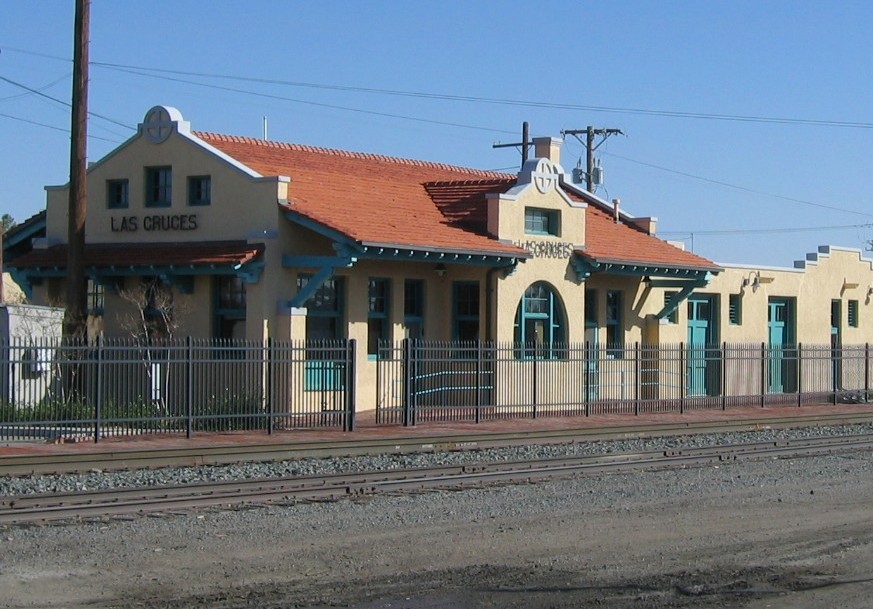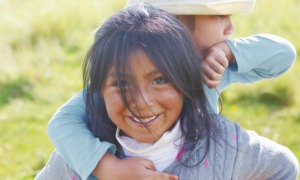
Ron Reiring/Wikimedia Commons
A train station in Las Cruces, N.M.
Transitioning out of juvenile justice is already laborious for many young people. It’s infinitely more difficult during a global pandemic.
“They’re literally coming back into the community from being in a facility so getting on their feet is what they’re trying to do,” said Jalyn Weiss, transition services coordinator for the juvenile justice department of the New Mexico Children, Youth and Families Department (CYFD).
“Finding a job is the hardest thing for them right now,” added Weiss, who works with youth from Doña Ana, Otero, Lincoln and Sierra counties. “They’re not able to get all of the documents they need, such as an ID or birth certificate or Social Security card because those offices have closed.”
The COVID-19 pandemic hasn’t been easy on the state’s system-involved young people, which includes foster youth and youth who have recently aged out of the state’s child protective services program. CYFD, aware that the coronavirus outbreak has likely hit its youth hard, has stepped up its efforts to make sure that vulnerable youth are supported. In some cases, administrators at the Santa Fe headquarters have asked certain CYFD staff members to contact and support youth who have aged out of state care in the past seven years.
The Las Cruces-based Weiss is one of the CYFD caseworkers who was asked to pull double duty during the pandemic. Though her caseload doubled as soon as she started working from home, she’s not complaining. Instead, she’s grateful to have an opportunity to support more kids.
“I’m still doing the same things I would do,” Weiss said. “Life is just a little bit more difficult for them, but a lot of them are still very resilient.”
Housing, documents major challenges
Prepandemic, Weiss chiefly helped young people transition out of the juvenile justice system, whether that was advocating for them during supervised release hearings or helping youth find housing and buy basic living supplies. A top need for these youth, especially in the Las Cruces area, is affordable housing as well as employment, food and clothing, she said.
“Most of our kids are on the higher end of needing services. A majority of them aren’t coming out to families, they’re coming out on their own, so they have nothing,” she said. “They’re in this middle ground. They’re not full adults who have their documents and their parents don’t have them, but they’re adults so they’re expected to have them.”
[Related: New Mexico Tribal, State Leaders Pulling Together Against Pandemic]
[Related: COVID-19 Challenges Don’t Stop Carlsbad Transitional Housing Program]
[Related: For New Mexican, Tribal Leaders, It’s ‘All Hands on Deck’ in 2 Counties]
[Related: Newly Updated Technology Helps CYFD Stay in Touch]
Before the coronavirus outbreak, if a youth needed something, Weiss would hop in the car and drive to the store or a Motor Vehicle Division office, which has been shuttered for months all over the state. Now, permission is required to go out into the field. These days, Weiss’ case management is performed with phone calls, by text message and through Facebook Messenger.
“For our clients that are in the [Doña Ana County Juvenile Detention Center], it’s been letting them know there’s someone out here who is getting things ready for them, who’s here to help them when they come out,” she said. “We can get them hooked up with Medicaid [and] food stamps. You can still call and do a lot of that stuff.”
CYFD contacted 500 aged-out youth in care
Weiss says she’s currently working with approximately 20 current or former youth in care in her expanded role. She’s noticed that a youth from the juvenile justice side might have different needs versus a young person from child protective services.
“My kids in juvenile justice services received a lot of skills and education when they were in the facility,” she said. “The protective services youth are in an environment where they’re just getting life skills, which they usually only get from agencies. However, [agencies] aren’t necessarily able to do the hands-on approach with them at this time.
“I’ve received kids who have been established in the community,” Weiss added. “They’ve been out of CYFD so they already have their documents, clothes [and] most of them already have a place to live, even though housing is still a need. Housing is difficult even without COVID[-19].”
Transportation has also presented a barrier for some youth who are still working in Las Cruces proper during the pandemic but live in distant rural areas.
“A lot of them will find jobs in Las Cruces and then come to town to work, but they’re not necessarily able to do that right now. There’s a bus from Anthony to Las Cruces,” said Weiss ( the two towns are about 25 miles apart), “but getting on that bus and being around people during this time is another thing.”
Due to the specific considerations for each youth, CYFD has stressed an individualized approach to meeting each young person’s needs during the pandemic. The coordinated effort reaches beyond current youth in care — the state agency has contacted more than 500 former youth in care.
Weiss says it has been a challenge reaching some youth, usually because a phone number is outdated or they may have moved out of state. However, she’s been able to track down a handful of young people on Facebook. Despite the extra workload, she is happy to help youth get through this abnormally scary time.
“I’ve always considered my job a helping profession, so I’ve continued being there to be a support and help the youth through their daily struggles,” Weiss said.
This story is part of a Youth Today project on foster care in New Mexico. It’s made possible in part by the May and Stanley Smith Charitable Trust. Youth Today is solely responsible for the content and maintains editorial independence.t































